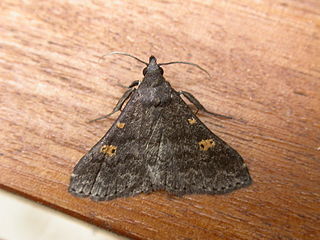
Naarda is a large genus of erebid moths currently encompassing 108 species. Initially identified by Francis Walker in 1866, it is in the family Erebidae. Somewhat ruddy in appearance, this genus is distinguishable for its generally slender thorax and abdomen, and straight, porrect labial palpi. Most species are a light tan color, but shading can reach as deep as a charcoal, with muddy yellow, conspicuous reniform, orbicular stigmata featured on the forewings, sometimes reflected bilaterally superior.
Dunira is a genus of moths of the family Erebidae. The genus was erected by Frederic Moore in 1885.
Hypenagonia is a genus of moths of the family Erebidae first described by George Hampson in 1893. The adult moths have pale brown wings with a dark band across each wing. The wingspan of these moths is about 1 centimeter.
Oxygonitis is a monotypic moth genus of the family Noctuidae. Its single species, Oxygonitis sericeata, is found in the Indian subregion, Myanmar, Sumatra, Peninsular Malaysia, Java, Borneo, the Philippines, Sulawesi, Australia and Sri Lanka. Both the genus and species were first described by George Hampson in 1893.
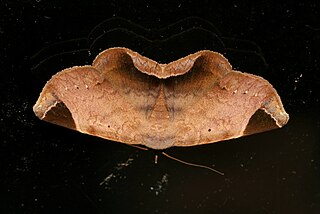
Psimada is a monotypic moth genus of the family Noctuidae. Its only species, Psimada quadripennis, is found in the Indian subregion, southern China, Taiwan, Myanmar, Thailand, Sri Lanka, the Andaman Islands, Sundaland, Sulawesi and Seram. Both the genus and species were first described by Francis Walker in 1858.

Rivula is a genus of moths in the family Erebidae described by Achille Guenée in 1845.

Tephriopis is a monotypic moth genus of the family Erebidae. Its only species, Tephriopis divulsa, was first described by Francis Walker in 1865.
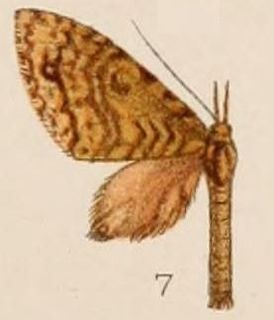
Sauris is a genus of moths in the family Geometridae erected by Achille Guenée in 1857.
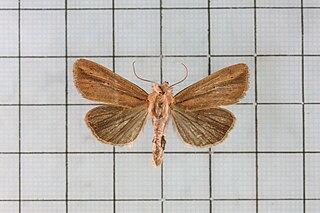
Mythimna pallidicosta is a moth in the family Noctuidae first described by George Hampson in 1894. It is found from north-eastern India to western China, Sri Lanka, Taiwan, Sundaland, Flores, the Philippines and Japan.

Orgyia postica, the cocoa tussock moth or hevea tussock moth, is a species of moth of the subfamily Lymantriinae of family Erebidae found from the Oriental tropics of India, Sri Lanka, Myanmar, Borneo, Java, New Guinea and Taiwan. It was described by Francis Walker in 1855.

Scirpophaga incertulas, the yellow stem borer or rice yellow stem borer, is a species of moth of the family Crambidae. It was described by Francis Walker in 1863. It is found in Afghanistan, Nepal, north-eastern India, Sri Lanka, Bangladesh, Myanmar, Vietnam, Thailand, Malaysia, Singapore, Sumatra, Java, Borneo, Sumba, Sulawesi, the Philippines, Taiwan, China and Japan.
Ancylolomia chrysographellus, the angled grass moth, is a species of moth in the family Crambidae. It is found on Cyprus and in Kenya, Uganda, Yemen, India, Pakistan, Sri Lanka, Myanmar, China, Korea, Japan, Taiwan, the Philippines and Indonesia.
Episparis liturata is a moth of the family Noctuidae first described by George Hampson in 1893. It is found in India, Sri Lanka, Java, Borneo, Myanmar, China and Thailand.
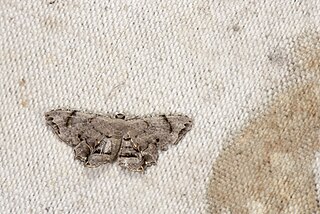
Dysaethria fulvihamata is a moth of the family Uraniidae first described by George Hampson in. It is found in Sri Lanka, Taiwan, Hong Kong, the Ryukyu Islands and Borneo.
Dysaethria scopocera is a moth of the family Uraniidae first described by George Hampson in 1896. It is found in Sri Lanka, Taiwan, Malaysia and Borneo.
Metorthocheilus emarginata, or Chundana emarginata, is a moth of the family Uraniidae first described by George Hampson in 1891. It is found in the Indian subregion, Sri Lanka, Taiwan, Borneo, Java and Seram.

Progonia kurosawai is a moth of the family Noctuidae first described by Owada in 1987. It is found in Japan, Sri Lanka, Taiwan, Nepal, Myanmar, Borneo and Sulawesi.
Rivula bioculalis is a moth of the family Erebidae first described by Frederic Moore in 1877. It is found in Sri Lanka, the Andaman Islands, the Indian subregion, Taiwan, Thailand and Borneo.

Rivula aequalis is a moth of the family Erebidae first described by Francis Walker in 1863. It is found in Sri Lanka, the Indian subregion, Japan, Sundaland, the Philippines and Sulawesi.
Pterogonia nubes is a moth of the family Nolidae first described by George Hampson in 1893. It is found in Sri Lanka, Peninsular Malaysia, Sumatra, Borneo, the Philippines and Sulawesi.















